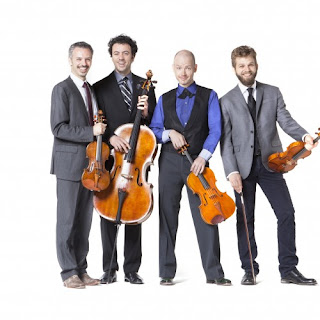Brooklyn Rider contrasts old and new song universes, with Anne Sophie van Otter's help
Many indications of how Brooklyn Rider stands out from the abundance of young string quartets were confirmed for me by how they managed to make two discs of Philip Glass interesting.
 |
| Brooklyn Rider in an upbeat pose at the opposite pole of the Schubert it played. |
That was several years ago, and to my ears, the preparation — to the point of artistic triumph — of music of "repetitive structures" (which the composer prefers to "minimalism") must pose almost more of a challenge to players than even the high modernism of Elliott Carter and others. To this listener, the challenge never went away, but I have been moved to great admiration of this ensemble out of its commitment across broad musical terrain.
The musicians (Colin Jacobsen and Johnny Gandelsman, violins; Nicholas Cords, viola; Michael Nicolas, cello) put both old and new music into personalized contexts, allowing for maximized expressive distinction over time.
Brooklyn Rider's name puns on "Blaue Reiter," the German expressionist movement in visual art of more than a century ago. The American friskiness of the name choice also suggests the time-tested stamp of a transit system that, by association, is responsible for the name of baseball's storied Brooklyn Dodgers. Inhabitants of that New York City borough became adept at dodging trolleys on Brooklyn's busy streets, a skill immortalized in the team name. So Brooklyn Rider is creatively going along for the historical ride on two continents.
 |
| Mezzo-soprano von Otter showed mastery of both styles. |
The quartet's appearance Friday night at the Palladium has the artistic benefit of a collaboration with Anne Sophie von Otter, a Swedish-American mezzo-soprano of distinguished accomplishment. The program, titled "Songs of Love and Death," set songs by the contemporary singer-songwriter Rufus Wainwright at either end of a program concentrating on Franz Schubert.
Movements of the Austrian composer's "Death and the Maiden" Quartet were separated by song renditions from his "Winterreise" cycle. Otter's performances of "Der Wegweiser," "Die Nebensonnen" and "Einsamkeit" had a significant glow of wintry light amid the gloom of their German poetic texts. In this intermissionless concert, the whole Schubert set had a worthy prelude with the song that lends its name to the work. The songs originally had piano accompaniment, but the visionary contemporary composer Osvaldo Golijov arranged that accompaniment for string quartet.
The collaboration was stunningly apt, and the famous work's movements are each so distinctive and elaborate that dividing the composition in this manner did not strike me as a rude interruption. Johnny Gandelsman played first violin in the Schubert, with particular gracefulness and sustained mystery in the variations movement (Andante con moto). From all four players, the outbursts of energy, sometimes pivoting between exhilaration and despair, were well contrasted with the softening of intensity in the opening movement.
The most haunting evocation of mystery is to the credit of the mezzo-soprano in "Die Nebensonnen" (Mock Suns), in which the lonely wanderer in "Winterreise" virtually hallucinates. Golijov, himself a master of subtly exotic implications, is at his best in the display of pizzicato he gives to the quartet in "Einsamkeit."
With Colin Jacobsen as the arranger of the Wainwright songs, Gandelsman and he switched first-violin positions. Opening with "Trois Valses Anglaises," the five musicians conveyed the wit and charm of the composer, with a particularly animated, waltzing lilt in "Listen to the Queen."
The singer readily adopted a mainstream pop manner for these songs. Though her diction was clear and her expression vibrant, that kind of voice production seems to require a microphone to come across well. She did not use one, and it's not so much that the string players covered her as that projection of the voice for this kind of singing needs amplification.
That impression was confirmed when Wainwright's music came back after the long Schubert set. Drawn from his "Songs for Lulu," the worldly wise urbanite comes through in the fluctuating purchase on happiness embodied in "Give Me What I Want" and "Sad With What I Have" and, most crucially, in "Who Are You New York." The best thing about this sort of conclusion, away from the faded world of an authentically stamped masterpiece, was that the inspired partnership between a major string quartet and a well-seasoned singer moved to the concert's forefront and left the best possible impression as the small audience departed into the plunging cold.



Comments
Post a Comment